The Effects of Carbohydrates on Your Workout – Part 1: Pre Workout
For many of us, carbohydrates seem to be the most important and most debated macronutrient when speaking on building muscle. ...
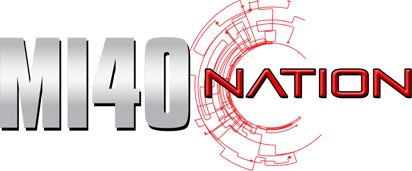
For many of us, carbohydrates seem to be the most important and most debated macronutrient when speaking on building muscle. ...
Imagine an image such as this…. You are in your car heading to the gym to train today. You have ...
In this eye-opening article, Ben gives a breakdown of what cardio ‘actually’ is, and how the application of this newfound ...
In this day and age, exercise and general health have become not only a trend but a necessity. Townships and ...
Question: “We all know that it’s essential for anyone who trains hard to recover sufficiently to continuously improve their performance and physique. What ...
If you’re wondering around the health section at your local grocer, it will be hard not to find a product ...
Despite our muscle gains and the conditioning we are able to achieve, many of us remain unhappy with our physical ...
Looking for lazer focus and unabated energy during tough workouts? Tyrosine could be the superamino you need to swoop in ...
The hormonal and metabolic processes that occur during sleep The three primary factors to consider for those seeking muscle hypertrophy ...
Muscles store carbohydrates exclusively as glycogen, which is basically a long chain of glucose molecules linked together. The level of ...
Fat loss is the ever-elusive conquest of anyone and everyone who is into health and fitness. Observationally I also think ...
In part one of this series, we dove into the science to explain the inner workings of testosterone. Now that we have a basic understanding of the mechanisms involved in the regulation and effects of testosterone, we can begin to discuss strategies for optimizing our own levels.
Who doesn’t want easier muscle gains and fat loss right?
Raising natural testosterone levels can be a tricky process. As we mentioned in part one, your body likes things the way it likes it, and it will actually do anything it can to thwart your attempts at boosting T-levels, but by using intelligent diet, supplementation, and lifestyle changes, we will not only raise our natural levels, but ensure that our testosterone is as effective as it can possibly be.
Bottom line, if you want to be in with a shot at achieving your best ever body and / or you just want accomplished progress, optimizing your testosterone levels is a MUST, so read on.
Nutrition
It may come as no surprise that nutrition plays a pivotal role in optimizing testosterone levels. Optimal nutrition, will promote optimal testosterone levels. As such, it is important to pay mind to all of the factors in your diet. The more complete and well balanced your nutrition, the better your body will function, and the higher your testosterone levels will be.
That being said, testosterone production is dependent on the presence of a few key vitamins, minerals, and nutrients that deserve special attention.
Increasing Testosterone Levels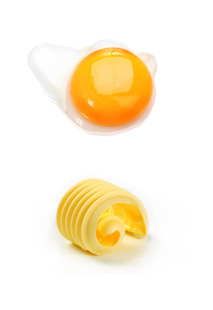
Preventing Decline
Lifestyle
Our testosterone levels depend on more than what we put in our body. What we do to our body can also have drastic effects on our levels of testosterone. The work we do inside the gym, and the good habits we adopt outside of it play their own unique role.
Exercise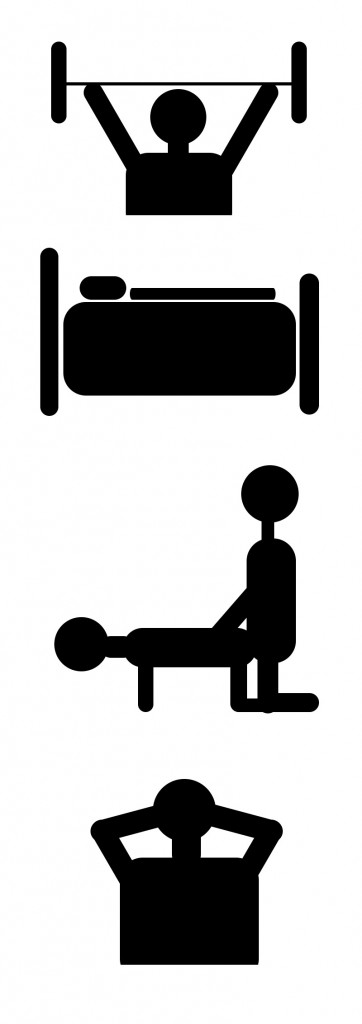
There is no argument that resistance training increases testosterone, study after study shows that it promotes acute increases.[7][9][10]
Although any kind of strength training is likely to boost levels, most studies show larger increases from compound exercises and higher intensities – this is likely due to the fact that the boost in testosterone is triggered by the physiological changes that result from subjecting a muscle to stress.
Since compound exercises involve stressing multiple muscle groups, and higher intensity means more stress, the resultant testosterone increase is greater with high intensity compound movements than in low intensity isolation exercises…just another great reason to squat!
Although the science suggests that the increase in testosterone resulting from exercise is negligible when it comes to potential gains, we have to remember that real life is not a scientific study. While it is true that exercise causes a minimal rise in testosterone in the lab, we can make the case that almost all of the methods in this article produce negligible changes when observed in isolation — and that is the key, when used in isolation.
The truth is, to boost testosterone levels naturally, we must do everything we can in the hopes that all the small steps will add up to a big leap. So in the grand scheme of things, the small rise in testosterone that occurs as a result of exercise is just as important as anything else we do to boost our T-levels… it is the culmination of all our efforts that will prove fruitful in the end.
Sleep
Sleep is rare commodity in today’s day and age. With the hustle and bustle of daily life and the constant distractions keeping us up at night, it is hard to get the sleep we need — but sleep is as vital as food and water.
Exemplifying its importance is the fact that people can live longer without food than they can without sleep. Amongst the many benefits that adequate sleep provides, is increased testosterone levels.[8] Studies consistently show that those who get more sleep have higher testosterone levels. Though the trend is clear, the amount needed to see benefits can vary per individual.
Recommendations for general recuperation fall between 6-10 hours, but where you fall within that range depends not only on how hard you work during the day, but how well you sleep at night. So play around with your sleep schedule until you find what leaves you the most refreshed.
Sex
There was a time when people used to abstain from sex before athletic competitions for fear that it would lower their testosterone levels, but thanks to modern science, we now know this not to be true.[13] In fact, sex increases testosterone levels… so, you do the math 😉
Curiously, this does not appear to be the case with masturbation.[14] Although the reason isn’t clear, it likely has to do with the interplay of hormones involved in pair bonding that lead to a rise in T-levels following ‘the deed’, hormones that are missing during masturbation… in other words, ‘ahem’, close that “other” browser window, it’s not doing your testosterone levels any good despite what you might try to tell yourself 😉
Stress
Stress can wreak havoc on a body, from causing insulin resistance, to lowering testosterone, stress is a terrible thing. Stress, as many of you have no doubt heard time and time again, increases the hormone cortisol, which, when chronically elevated, can counter the beneficial effects of testosterone. By this logic, we can potentiate the effects of testosterone by lowering stress levels. Therefore, get up from behind that desk, get out and have some fun – it will do you more good than you can imagine!
Body Fat
Excess body fat is not desirable for many reasons, but it may surprise some of you to find that excess body fat may lead to decreased testosterone. Although the true relationship may be more complex, many speculate that the relationship between excess body fat and low testosterone is related to estrogen production.
In part one of this series, we mentioned how testosterone is converted to estrogen by the body. Well, it turns out that this process requires an enzyme known as aromatase, and aromatase is especially high in adipose tissue (fat). Furthermore, remember how we mentioned the bit about negative feedback and how excess testosterone can signal the hypothalamus to stop production of more testosterone? Well, estrogen is actually a much more potent negative feedback inhibitor than testosterone… excess estrogen acts on the hypothalamus to stop testosterone production dead in its tracks.
This all results in a vicious cycle whereby more body fat, leads to more aromatase, which leads to more conversion of testosterone to estrogen, which leads to decreased testosterone production, which leads to more solo viewings of The Notebook…
In addition to the topics mentioned in this section, there are other lifestyle factors that may also increase testosterone levels – simple things like talking to a person you find attractive, becoming sexually aroused, even seeing the color red may boost testosterone, albeit in small quantities and for a brief amount of time.
Supplements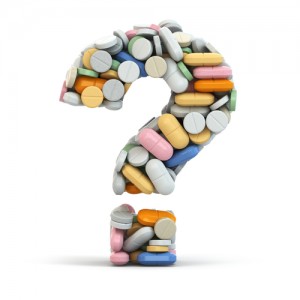
The supplement industry is riddled with big promises and false hopes, and testosterone boosting supplements are no exception. The majority of supplements available today do next to nothing when it comes to boosting testosterone.
Luckily, weeding through the shelves does leave us with a few compoundswhich have proven themselves effective.
DAA
D-Aspartic Acid, or DAA for short, is one of the most well studied and effective compounds for boosting testosterone. DAA works by acting on a subset of receptors in the hypothalamus to triggers the downstream production of testosterone.
Typically taken in doses of 3 grams per day, DAA is effective for increasing testosterone in men — but there is a catch. The increase in testosterone seen with DAA supplementation is only observed in men with compromised levels of testosterone. DAA fails to increase levels to higher than baseline in healthy adult men.
Although this may come as a disappointment, it doesn’t mean that DAA is completely useless. In fact, DAA can be extremely useful during times when testosterone is low, such as in overreaching phases, during calorie restriction, and in times of stress. This makes DAA an invaluable supplement to have in your arsenal for when testosterone levels are prone to decline.
Three grams per day for a period of 2-4 weeks is effective for restoring healthy testosterone levels.
Ashwagandha
Ashwagandha is not just a mouthful – a common ayurvedic herb, it can be used effectively to treat everything from cancer to anxiety, and amongst its many benefits is the potential to boost testosterone. Unfortunately, as is the case the DAA, this rise is only seen in people with low testosterone levels.
Again, like DAA, this may prove helpful when testosterone is low following prolonged dieting or intense training stretches.
One unique benefit of ashwagandha which may provide indirect effects on testosterone is its ability to significantly reduce cortisol. We said before that excess cortisol can counter the effects of testosterone, so by supplementing with ashwagandha, we may be able to reduce the effects of stress and increase the effects of testosterone.
Bulbine Natalensis
Bulbine natalensis is a relatively new supplement that has garnered a lot of attention in the supplement industry. Although there is little data to support its use in humans, animal studies show it to be an extremely potent testosterone boosting supplement. In fact, some rat studies show an increase in testosterone of over 300%, accompanied by a large decrease in estrogen.[15][16]
Needless to say, this supplement may turn out to be the holy grail of natural test boosters.
Despite the potential benefits, there do however appear to be some drawbacks. The herb is so potent that it may cause side effects similar to those seen with anabolic steroid abuse, which can include organ damage and negative effects on the lipid profile.
Additionally, the lack of human interventions leaves little data on safety and optimal dosing. Though this supplement may sound enticing, it would be wise to wait for more research regarding its short and long term effects before adopting supplementation.
Maximizing the Benefits
The effects of testosterone are not dependent on levels of testosterone alone. Not only do the regulatory factors that we discussed in part one (such as conversion, hormone binding, and negative feedback) play a role in the outcome of testosterone, but various other chemicals can play a part in altering the effect that testosterone ultimately has.
In fact, many researchers speculate that the inability for herbal supplements to increase testosterone levels above baseline may be due to other control mechanisms. Elevated testosterone may be inducing negative feedback, conversion, or other control mechanisms which prevent the supplements from elevating levels above that baseline.
Modulating these other factors may help us maximize the effects of our natural testosterone levels, and may even make some supplements more effective.
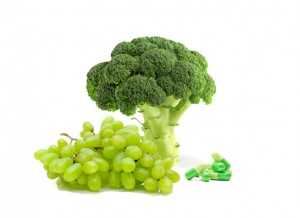
In Conclusion
Testosterone is a complex hormone. Aside from the plethora of effects that testosterone has on its own, there is an intricate interplay of various chemicals that play a part in the way testosterone ultimately functions. It is certain that testosterone improves strength and body composition, and it is also certain that higher levels garner greater gains, however boosting testosterone is easier said than done.
There are many factors we can manipulate, from diet, to lifestyle, to supplementation, which will all play a small part in boosting T-levels.
If we do our homework, and remain consistent in our efforts, then there is no doubt that these small adjustments will lead to massive gains!
References
[1] Hypothalamus. (2006, January 21). Retrieved from http://www.neuroanatomy.wisc.edu/coursebook/neuro2(2).pdf
[2] Morley, J. (2013, February 1). Overview of the Endocrine System. Retrieved from http://www.merckmanuals.com/professional/endocrine_and_metabolic_disorders/principles_of_endocrinology/overview_of_the_endocrine_system.html
[3] What is the pituitary gland? (n.d.). Retrieved from http://www.pituitary.org.uk/information/what-is-the-pituitary-gland/
[4] Kadi, F. (2008). Cellular And Molecular Mechanisms Responsible For The Action Of Testosterone On Human Skeletal Muscle. A Basis For Illegal Performance Enhancement.British Journal of Pharmacology, 154(3), 522-528.
[5] Pandini, G. (2005). Androgens Up-regulate the Insulin-like Growth Factor-I Receptor in Prostate Cancer Cells. Cancer Research, 65(5), 1849-1857.
[6] Cangemi, R., Friedmann, A., Holloszy, J., & Fontana, L. (2010). Long-term effects of calorie restriction on serum sex-hormone concentrations in men. Aging Cell, 9(2), 236-242.
[7] Vingren, J., Kraemer, W., Ratamess, N., Anderson, J., Volek, J., & Maresh, C. (2010). Testosterone physiology in resistance exercise and training: The up-stream regulatory elements. Sports Medicine, 40(12), 1037-1053.
[8] Penev, P. D. (2007). Association between sleep and morning testosterone levels in older men.Sleep, 30(4), 427.
[9] Kraemer, W. J., Gordon, S. E., Fleck, S. J., Marchitelli, L. J., Mello, R., Dziados, J. E., … & Fry, A. C. (1991). Endogenous anabolic hormonal and growth factor responses to heavy resistance exercise in males and females. International Journal of Sports Medicine, 12(2), 228-35.
[10] Ahtiainen, J. P., Pakarinen, A., Kraemer, W. J., & Hakkinen, K. (2004). Acute hormonal responses to heavy resistance exercise in strength athletes versus nonathletes. Canadian Journal of Applied Physiology, 29(5), 527-543.
[12] Dietary Intake and Supplementation: Effects on Testosterone. (n.d.). Retrieved from http://www.edb.utexas.edu/ssn/SN PDF/Other-Testosterone.PDF
[13] Dabbs, J., & Mohammed, S. (1992). Male and female salivary testosterone concentrations before and after sexual activity. Physiology & Behavior, 52(1), 195-197.
[14] Jiang, M., Jiang, X., Zou, Q., & Shen, J. (2003). A research on the relationship between ejaculation and serum testosterone level in men. Journal of Zhejiang University, 4(2), 236-240.
[15] Yakubu, M., & Afolayan, A. (2009). Reproductive toxicologic evaluations of Bulbine natalensis Baker stem extract in albino rats. Theriogenology, 72(3), 322-332.
[16] Yakubu, M., & Afolayan, A. (2010). Anabolic and androgenic activities of Bulbine natalensis stem in male Wistar rats. Pharmaceutical Biology, 48(5), 568-576.
[17] Balunas, M., Su, B., Brueggemeier, R., & Kinghorn, A. (2008). Natural Products as Aromatase Inhibitors. Anti-cancer Agents in Medicinal Chemistry, 8(6), 646-682.
[18] Allen, N., Appleby, P., Davey, G., & Key, T. (2002). Lifestyle and nutritional determinants of bioavailable androgens and related hormones in British men. Cancer Causes & Control,13(4), 353-363.
[19] Kiddy, D., Hamilton-Fairley, D., Seppälä, M., Koistinen, R., James, V., Reed, M., & Franks, S. (1989). Diet-Induced Changes In Sex Hormone Binding Globulin And Free Testosterone In Women With Normal Or Polycystic Ovaries: Correlation With Serum Insulin And Insulin-Like Growth Factor-I. Clinical Endocrinology, 31(6), 757-764.
[20] Curtis, F., & Orwell, S. (n.d.). How can I increase testosterone naturally? Retrieved from http://examine.com/faq/how-can-i-increase-testosterone-naturally.html